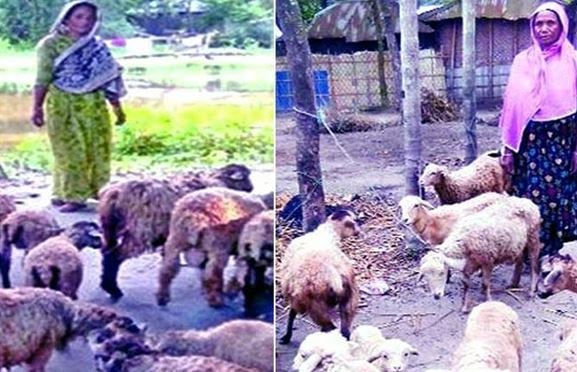News Flash
News Flash

RANGPUR, June 17, 2025 (BSS) - In the recent past, many extremely poor rural women in the district have become economically self-reliant by raising sheep, and empowered themselves in their families and communities.
These successful women, who lived in poverty in the past, have improved their standard of living and are living a comfortable life with their family members, and their children are receiving education in various educational institutions.
Talking to BSS, several rural women involved in sheep raising narrated their success stories of overcoming poverty and achieving self-reliance through rearing sheep.
Rashida Begum, a fifty-five-year-old housewife, of village Laxmipur in Taraganj upazila said she was married with day-labourer Mansur Ali, 62, of the village about 45 years ago.
The couple had no alternative to working as day-labourers to earn livelihoods. Rashida gave birth to two sons and a daughter amid poverty.
The daily wage for a day-labourer was very low and they did not find work everyday at that time when most of the local people in the area were poor and living below the poverty line.
"We had to starve frequently despite struggling everyday to earn livelihoods," she said, adding that they could not regularly provide meals to their children.
At one stage, she borrowed Taka and bought a female sheep at Taka 365 seventeen years back.
After six months, the sheep gave birth to four cubs and also gave birth to four more cubs after the next six months.
"I did not have to look behind any more. The number of my sheep continued to rise every year and I started meeting all expenses by selling sheep," she said.
By this time, Rashida married off her only daughter and her sons also got married.
Rashida has 45 sheep after leasing out a large number of sheep to neighbors to rear and share the profit, and gifting about 32 sheep to her sons, daughters, and in-laws, over the years.
"I usually give sheep as gifts to our relatives and neighbors on birthdays or weddings," she said, adding that she and her husband now always look after their sheep.
Rashida has taken some cultivable land on lease and built a house on her own land. They are well-off and her husband no longer works as a daily wage labourer.
"Sheep rearing has changed my fortune, brought economic self-reliance and social dignity and honour to me," Rashida said with a smile.
She is now planning to set up a modern sheep rearing farm on their courtyard and the Upazila Livestock office is providing all necessary technical assistance to them in this regard.
Like Rashida, about 100 women, including her neighbours Sharifa Begum, Ambia Begum, Khadija Khatun , Khaleda Yasmin, Rahima Begum and many others of the village are now rearing sheep to change their fortune.
Similarly, housewife Manira Begum of Char Gannarpar village on the Teesta riverbed in Gangachara upazila said she has become a self-reliant woman in her community by rearing sheep.
Living in a thatched hut on someone else's land in the remote Char village, the hardships of Manira, her farm laborer husband Alauddin Mia, and their two daughters knew no bounds.
The couple worked as farm laborers to feed their daughters. Due to the lack of regular work, especially during the seasonal lean periods, they were unable to earn enough to feed their daughters.
Manira somehow bought three sheep sixteen years ago. She started taking care of her sheep. After six months, each of the three sheep gave birth to three to four cubs.
Within another six months, they gave birth to three to four more cubs each as the process continued for twelve years, totally changing Manira's life.
"I started meeting all expenses of my family by selling sheep. I have 45 sheep now," she said.
By this time, Manira sold 100 sheep at rates between Taka 2,500 and Taka 8,000 for each. She has built a better house.
"I graze the flock of my sheep daily on char areas from morning to afternoon when I move in the front and my sheep herds follow me in the back row," she said.
She feels bad when she sells some of them in need or their number becomes higher to accommodate at home.
Manira said she faces little troubles during floods to keep her sheep on her homesteads in addition to managing fodder that time.
District Livestock Officer Dr Md Abu Sayeed told BSS that the reproduction rate of sheep has increased substantially in the district in recent years.
Currently, the number of sheep stands at around 50,000. The number continues rising every year.
"We are helping rural people, especially poor rural women, expand sheep farming and increase meat production to meet the nutritional needs of the population across the district. Many rural women have changed their fortunes through raising sheep"